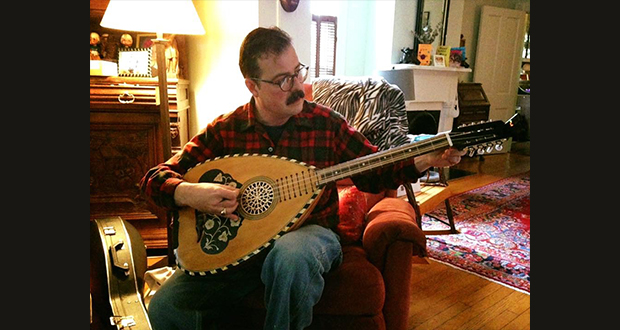To begin with, Chris, after everything I’ve read about you and further to our exchange of emails these past few days, I’d like you to know that I feel like I already know you and that I’m chatting with a friend with whom I’ll be going out tonight for a bite to eat and some tsipouro (which I’ve learned you really like!). This is why I am referring to you on a first name basis (as you requested). It seems unbelievable to me that someone with such a magnificent background, a Grammy award winner, would concern himself with traditional Greek music, given the fact that many Greeks (I don’t want to say most) tend to ignore it and are drawn to contemporary music or other kind of music altogether. But, let’s start at the beginning. How were you first introduced to this type of music? What was it that dazzled you, enough so that you said “I want to release a collection with these rare recordings”?
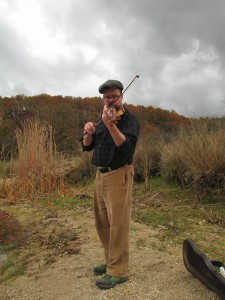
Chris playing violin by Lake Zaravina photo by Vassilis Georganos
Thank you Anna. I am honored to be asked to talk about my love of Greek traditional music, one of the greatest cultural assets that I’ve ever encountered. And, it belongs to all the Greek people: a collective treasure. To answer #1: I first discovered demotika when I was in Constantinople several years ago. I visited the Asian side of the city in search of a place called the «Street of Gramophones,» an area in a bazaar that sold very old 78 rpm discs (the records made from the 1890s until the 1950s). I found a stack of old Greek discs here that seemed curious: the titles did not make sense (I studied ancient Greek in college) and so I bought them. They turned out to be klarino kai violi musiki from Epirus with Kitsos Harisiadis and Demetris Halkias.
When I arrived home back and Virginia and played these discs, I immediately became entranced, hypnotized, «hooked» as some would say. They kind of put me in a deep trance and when I emerged, I felt «alive», as if I had just experienced a deep catharisis. But also I was curious—deeply curious—what the function was behind this music, what the meaning and purpose of it was. It was both alien and yet familiar. So my natural curiousity was to seek out not only all the demotik music from Epirus but also all the various forms and types of demotik music: Peloponnese, Thrace, Macedonia, Crete, Thessaly. But to answer your question: I want to release these recordings so that I may understand the function of this music in the rural villages since it is powerful medicine. Maybe that is the right way of putting it: demotika is a strong therapeutic, curative phenomenon, certainly spiritual and mystical but also very, very real. Do you know what I mean?
I think earlier—two generations ago or more—song and dance served much deeper psychological and existential functions. Music was a tool for survival, not simply for entertainment. Music was serious business since it tied you to your particular village, particular region
I know exactly what you mean! What is the purpose of releasing this specific collection Chris and what is your future plan?
The purpose of this specific collection was to explore how rural Greeks (those that lived largely in the village lifestyle) confronted and dealt with the notion of loss, change and death. I think earlier—two generations ago or more—song and dance served much deeper psychological and existential functions. Music was a tool for survival, not simply for entertainment. Music was serious business since it tied you to your particular village, particular region and—in many ways—solidly identified you as Greek. Certain rhythms, dances, and melodies could only be heard in one village and it was what people wanted to hear in order to get them through the bad times, «the Turkish evils,» what I would refer to as «The Dangerous Hour» when people felt life’s deep uncertainties such as invasion, starvation, disease, and Death. Demotik music helped to deal with these uncertainties. And so this collection is my way of both understanding this unique cultural phenomenon but also to «give it back» to where it belongs, to the Greek people.
This collection is also a part in a larger serialization—what I would call an exploration of what music means and what it was originally meant to do «skopimos musiki». Since Western intellectual thought (music, art, medicine, philosophy) begins with and is indebted to Ancient Greek thought, it seems natural that this is the starting point. I studied Greek philosophy and literature in college and I’ve always been interested in the notion that one can explore philosophical themes through literature (like Albert Camus, Satre, etc). So, why shouldn’t one explore philosophical themes (such as identity, self-awareness, aesthetics, the problem of Evil/Bad) through music. By combining story telling narratives, historical writing, and music, can we not understand philosophical questions and problems in a deeper more meaninful way, like in literature? There is certainly a symbiosis between music, philosophy and story-telling, no?
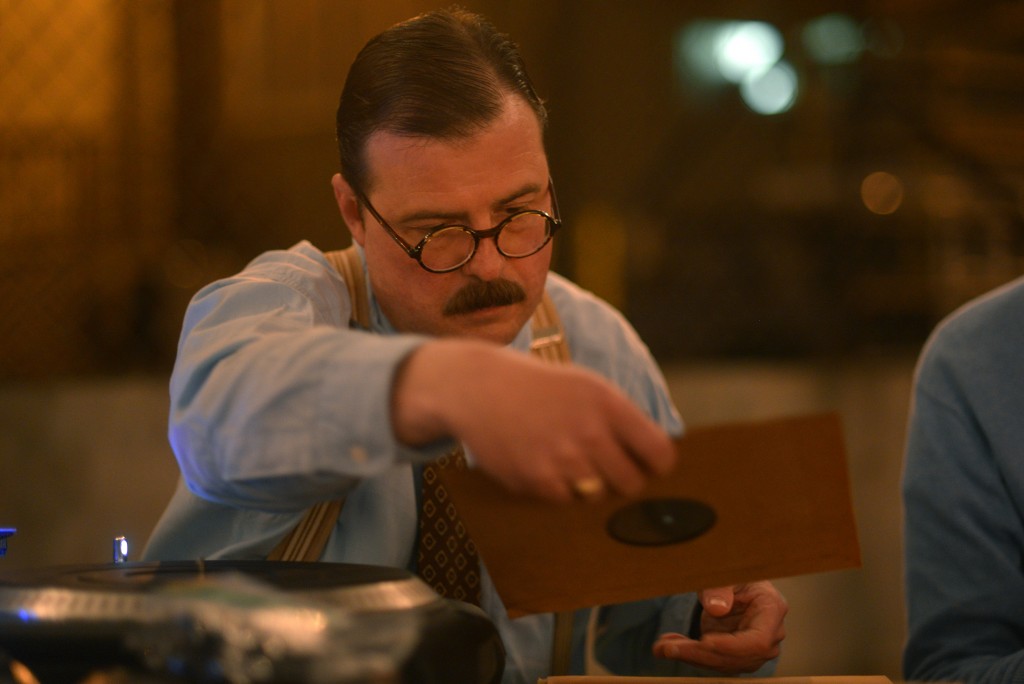
Chris-playing-78s
Whom do you believe this specific content addresses?
Actually, this collection, like my others, is addressed to all of humanity. It is kind of like a «love letter» to the best parts of humanity. Anyone that has the capacity to suffer, to question, to feel this music in their heart is the «target audience.» Ultimately I think that we all have this capacity but are we willing to start with such curious notions that that there is music that «heals» such as demotika and that there is music that does nothing «in my mind, practically all other music that is not folk music»? This is indeed a unusual starting point for these collections and I’m not sure how many people are willing to start with this assumption. But it is the case that anyone who listens to this music is given an opportunity to hear the best part of ourselves.
Ιn Epirus, particularly in central Zagori in the village of Vitsa, the cultural ties are very, very strong. That is one reason why the unique dances, the special songs, and the way of playing them to the heart of Zagorians still persists and remains vital in the 21st century
Is it your belief that everyone involved in Greek tradition these days has the culture required to appreciate this “treasure”?
I certainly feel that everyone involved in Greek traditional music and dance has the potential to appreciate what is found in this collection. Because I’ve not traveled everywhere and I don’t know everyone, I can only comment upon what I’ve experienced. I know that in Epirus, particularly in central Zagori in the village of Vitsa, the cultural ties are very, very strong. That is one reason why the unique dances, the special songs, and the way of playing them to the heart of Zagorians still persists and remains vital in the 21st century. Much of this is do to the Cultural Committees and the people responsible for maintaining tradition. And, the way it works in Vitsa, is that everyone, young and old, help out and work to make sure that cultural continuity is maintained. You know what I mean? I’m sure in other parts of Greece and on the islands there are similarly strong ties to tradition, such as in certain parts of Crete. But then you have to ask yourself—is culture and tradition enough?
Music is a very fragile thing and if it is not carefully, lovingly maintained, it can die just like any other cultural expression. For instance, I love early Cajun music from South-West Louisiana. However, even though the Cajuns take their culture and tradition very seriously, the music itself has—in my opinion—died. A lot of it has to do with commercialization, migration and especially amplification of instruments. Amplification has killed most of the best folk music in the world. Then again, any small thing can weaken a folk music. Music is just as fragile as a rare species of bird: change one thing in the unique biosphere and it unbalances the whole works.
This double collection contains 28 rare and undistributed songs, from Epirus and other parts of Greece. “Enas aetos”, “E triantafyllia”, “Poustseno” etc. What led you to choose «Γιατί είναι μαύρα τα βουνά» (“Why are the mountains black?”) as the title of this work?
I chose that title for several reasons. The main reason is how I understand this music. One response that Greeks have had for millennia when confronting Death, uncertainty, turmoil, crisis after crisis, is through song, dance, and deep folk poetry, such as this mirologi. As you know, this was originally a mirologi—a song of lamentation—that is ancient and was collected in written form over 300 years ago. Even at this time, this song represented something profound to «outsiders,» i.e., other Europeans. For instance, Goethe said this about « Γιατί είναι μαύρα τα βουνά »:
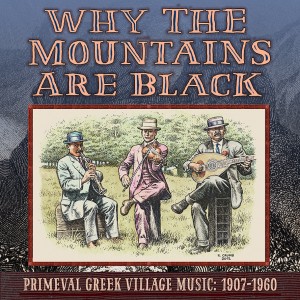
Why the mountains are black
«Τα σύγχρονα δημοτικά τραγούδια των Ελλήνων είναι τα ωραιότερα από όσα ξέρουμε από την άποψη λυρικής, δραματικής και επικής ποίησης.» (Από επιστολή που έστειλε στον γιο του Αύγουστο στο Μπισμπάντεν στις 5 Ιουλίου 1815)
«Κάθε φορά που διάβαζα το Ελληνικό δημοτικό τραγούδι «Το μοιρολόι του Χάρου» ξυπνούσαν μέσα μου όλες οι ψυχικές, πνευματικές και ηθικές δυνάμεις. Είναι κείμενο με τις υψηλότερες αξιώσεις της τέχνης.» (Από άρθρο του στο περιοδικό «Kunst und altertum», 1823, σχετικό με την μετάφραση των Ελλην. δημοτικών τραγουδιών, που έκανε.) And so, to me, the title of the collection conveys this profound emotional, psychological, philosophical and musical response that Greeks have had when confronted with the problem of Badness, Death, chaos, but also the title conveys a deep feeling of pride that Greeks should have in their legacy, in their poetry, in the power of their emotions. It is a very powerful, very suggestive title.
The prominent record label company “Third Man Records”, which belongs to Jack White of White Stripes (1997-2011), has taken on the production of this collection. What was the band members’ first reaction, and also the four writers’ first reaction (I am referring to the incident we read about in a relevant article of the Los Angeles Times) upon listening to this primal and distinct music?
The people at Third Man Records and the four writers that were visiting my studio were «overwhelmed» and «transfixed» when I played the 78 rpm discs for them from this collection. And that was kind of what I knew would happen. Anyone who hears the first four tracks from disc one is left hypnotized, disoriented, unable to tell what they just heard, where it was from, if it was 100 years old or ten days old. It caused one of the writers to combine boubon with tsipouro (and unwise action) such that he got quite drunk and tumbled down a hill at my house.
I’ve been producing historical music collections for nearly 20 years and nowhere have I felt more loved and welcomed than by the Greek people. There has been quite a few interviews and features on the collection as well as my interest in Greek music and culture.
We are talking about a very fine piece of work, with rare material, unique photographs and important information. How much time did you require to complete it and who helped you perform this difficult task?
This collection took approximately four years to research, write, collect the discs, improve the condition of some discs, design the artwork, and lovingly put it together. My work would be impossible without the help of many, many of my friends. Without Jim and Maria Potts, Demetrios P. Dallas, Costas Zissis, Alexis Papachristos, Philippos Gregorios Sougles, and Vassilis Georganos—and dozens of friends of mine in Epirus and Athens—I would not have been able to travel, research, or translate this material. My good collector friends Elias Barounis, George Karaiordanidis, and Rich Nevins provided me with excellent discs and images from which to work. My art designer friend Susan Archie made the whole collection beautiful. My close friend Ben Bruton proof-read and edited my notes and of course my friend Robert Crumb painted the cover for the collection. Of course the research took time but ultimately it was being there in Greece multiple times that gave me the most insight. For instance, I learned more when I spent four hours in the home of a Sarakatsani family in Vitsa—the home of Stratos Harisis—than I did reading several books on the Sarakatsani.
Have you ever considered contacting the relatives of the musicians who took part in the performances? To learn about their life or any other information regarding the material you published?
Actually, I have been in contact with quite a few relatives of the musicians. Everytime I visit Epirus, I stop by to see Napoleon and Michalis Zoumbas, the nephews of Alexis Zoumbas. This August I shall be meeting and interviewing a niece and fellow musicians of the clarinetist, Kitsos Harisiadis.
Did you realize while putting together this collection that it would be a completely non-commercial (non-profit) album? I am certain that your motive was pure emotion – this music touched your heart.
Yes! These collections are not for money: there is no real profit. I think I get a little poorer in my wallet everytime I produce one of these collections. But my heart gets bigger and I get wiser. Which is more important do you think?
I think, after all the things we’ve been talking for the last weeks, you already know that I totally agree with you on that.. What response has the album gotten so far from Greeks? Has any Greek organization shown any interest in this particular, outstanding collection?
So far, I have been overwhelmingly pleased by the number of Greeks that have reached out to me to tell me how touched they are by this collection. You really don’t get this kind of response in America. I’ve been producing historical music collections for nearly 20 years and nowhere have I felt more loved and welcomed than by the Greek people. There has been quite a few interviews and features on the collection as well as my interest in Greek music and culture. I’ve made many new friends. I learned that the collection is now available in record stores in Athens and that it is being distributed by Elias Aslanoglou of Rockarolla Distribution. I was very concerned that people would want this music but that they couldn’t get it except by expensive means. I am more content now that I know that it can be obtained affordably. So far I’ve not been contacted by any Greek organizations. I would love to have a release event in Athens—something with national character—but I may have to wait until I’m in Athens in July to research this. I do work with ZEN—Zagori Excellent Network—on cultural tourism for the region and so perhaps I can work with them for a release event in the near future.
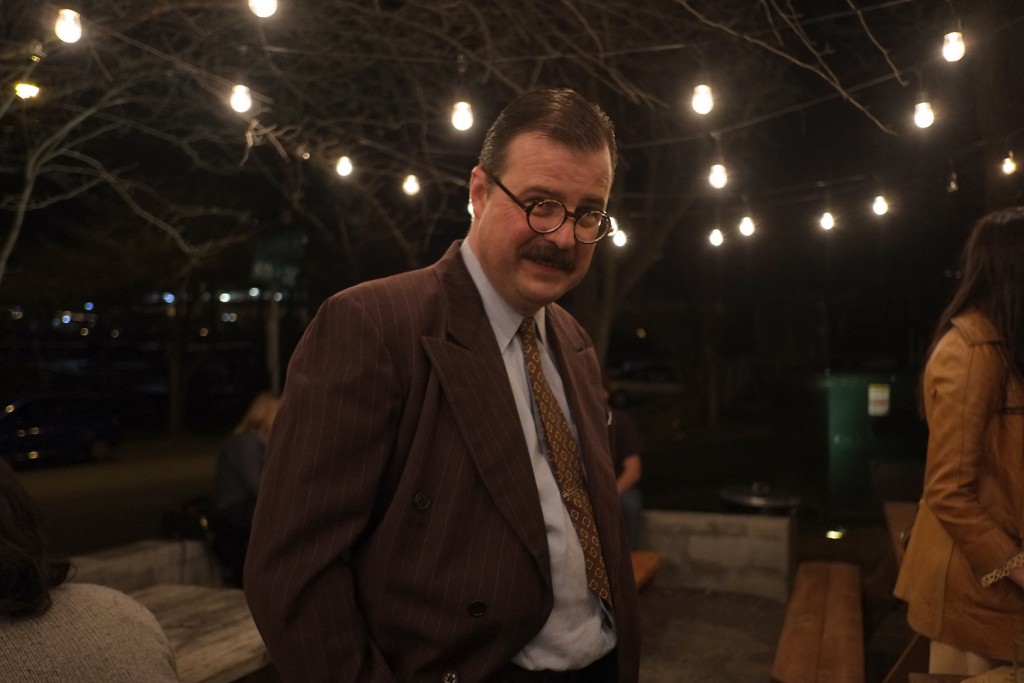
Chris at book festival
What is your opinion on today’s traditional bands and on the future of traditional Greek music in general? Based on everything you’ve heard and on your experiences, your research and your knowledge, what are the differences between today’s musicians and the musicians of the past?
There are some exceptionally great—majestic—musicians playing today in Epirus. You have people like Thomas Haligiannis and Kostas Karapanos who play directly in the Zagorian style of Gregory Kapsalis. Their group—ΤΑΚΙΜΙ—is just incredible, the best! You also have many, many younger musicians in Ioannina and other locations south of here that are playing in the right way: the old style of playing. Slow, thoughtful, taking their time with each note. Every time I return to Epirus, I try to go and here some of these younger musicians. I think there is reason to believe that traditional Greek music will have a renewal and actually get stronger if it returns to its roots. I think the main difference between today’s musicians and those from the past is the social function of the music: when people take deep pride in their homesoil and return for the paniyeri and the glyndi, the weddings and so forth, the pride feeds back to the musicians, making the music better. Do you know what I mean?
I am from Vitsa! I was made a villager by the people of Vitsa in 2015. I do wish I was born and raised there just so the language would be easier but I feel more at home in Vitsa than I do in Virginia where I was born and raised.
Of course! You have released other collections as well; “Five Days Married And Other Laments, Songs and Dance From Northern Greece”, “Beyond Rembetika, the music and dance of the region of Epirus”, “Alexis Zoumbas, A Lament for Epirus”. Following the collection “Why the Mountains Are Black”, what else can we expect? Do you have any counterpart material ready for circulation?
I am planning to issue a collection of recordings by Kitsos Harisiadis entitled «Lament In Deep Style: 1929-1958.» After that will be a 2 disc collection of music from Asia Minor that will be very similar to «Why The Mountains Are Black.» It is kind of a reflection on «Why The Mountains Are Black» and also on Greek identity. When my book on the music of Epirus is finished, I also plan to have a companion CD/LP/DVD that people can play while they read. I have another four more collections of early Greek music that I’d like to issue before I die.
You have a general love for anything old, for types of music going extinct, like Cajun music that used to be played in southwestern Louisiana. In fact, you’ve circulated a counterpart album with rare recordings. What is the reason you are so interested in these kinds of music, and not, for example, something more contemporary or more profitable?
That is a good question. I guess part of me just likes old-fashioned things. Another part of me longs for the past: I tend to romanticize the past. To me things were better when they were simplier, like being a child. Having less choices is not a bad thing if you enjoy what you have, no? I get very nostalgic thinking about how much more powerful music and beliefs were two or three generations ago. Maybe I just tend to long for things, the way I think they ought to be. I know it is unrealistic, but sometimes I just value the older way of life compared to the new. For instance, very few people would give up their car but when you think about how things were in the old days, your car can get you to other places but it can’t fertilize your vegetable garden. Therefore, sometimes I’d rather have a mule. To me, the music of the past is like good tsipouro whereas music of today is just a bland, tasteless substance, containing nothing.
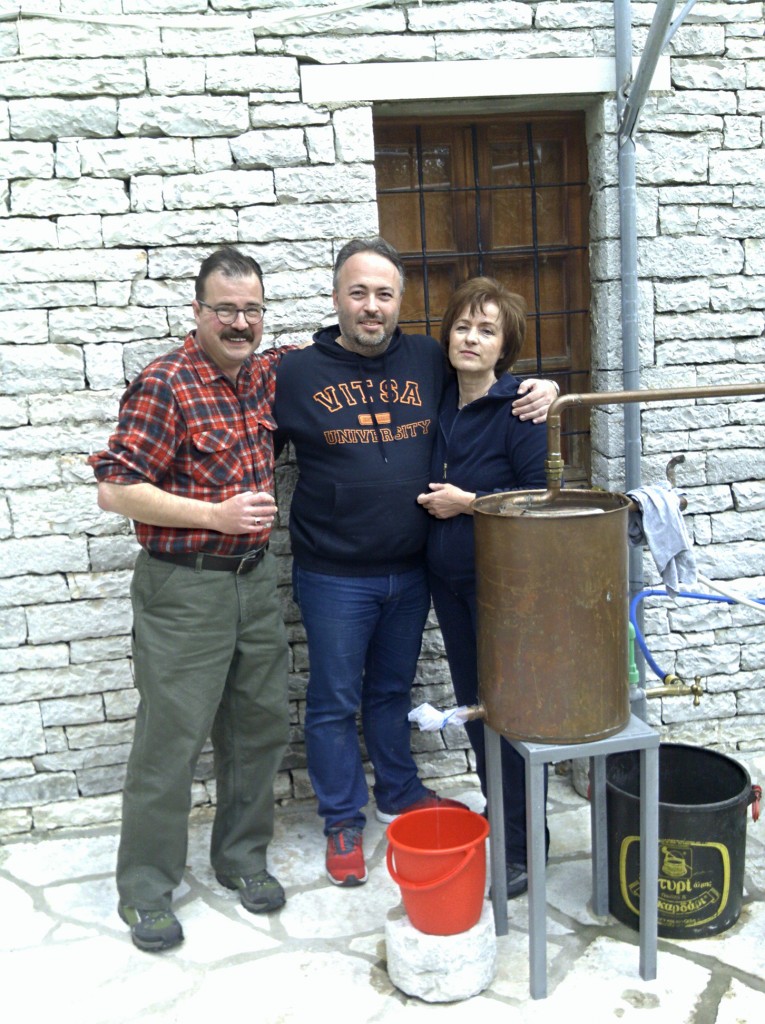
Making tsipouro with Alexandros Spyrou
Is it my idea, or do you feel a bit like you are from Epirus? What is it about the place that has so enchanted you? Do you visit Epirus often, and if so, which part of it? Would we be likely to find you there at some local festival/dance?
I am from Vitsa! I was made a villager by the people of Vitsa in 2015. I do wish I was born and raised there just so the language would be easier but I feel more at home in Vitsa than I do in Virginia where I was born and raised. I feel half my age, a young buck, when I arrive in the village. Almost everything about it is perfect. The music, the air, the people, the water, the forest, the food, everything. I go there whenever I can—normally most of August I will be there to attend the paniyeri on the 14th, 15th and 16th. Also, I love it there in November when they make the tsipouro. They have a musical event when the village makes the tsipouro and the food, the company, everything is magical.
We heard that you are preparing a book about Epirus. What will it include?
This book is a musical-travelogue which tells the story of Epirus through its culture, its music and its history. It is not an «objective» or «scholarly» book but rather it is a personal account of the music, my discoveries, my experiences and interactions with the music and with the people. It moves back and forth between the first person and the third person and it attempts to make the music understandable for those outside of the culture. I provide evidence and arguments for where this music comes from, what it is meant to do, and possibly how it could transform us nowadays. I spend a lot of time talking about the old music from the region, before we were born.
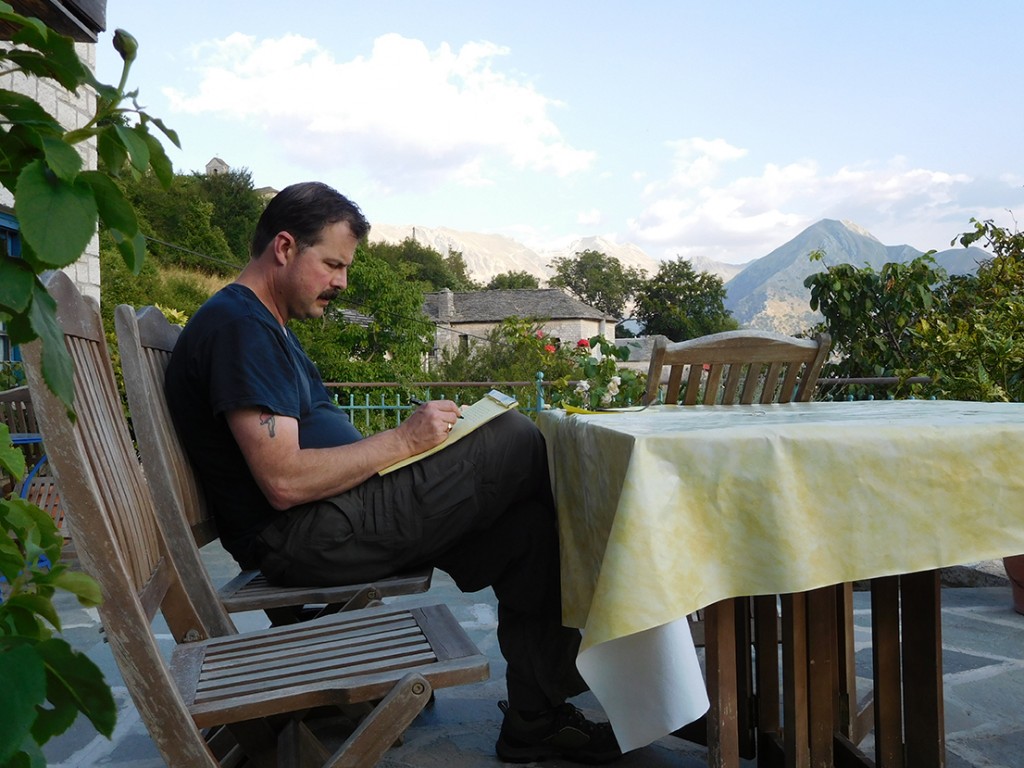
Taking notes in Vlach village of Kalarrites Photo by Steva Stowell Hardcastle
Finally, what do you think it takes to make other young people turn to traditional Greek music? There has been a trend of this sort in the last years, but it definitely needs to be amplified. What would you say to them to motivate them to listen to this kind of music and to learn how to play a musical instrument?
I agree, there has been a trend of younger people returning and wanting to play «real music,» music that is very comfortable in its own skin and powerful, full of vitality. My advice is probably not good advice but you asked for it. I strongly recommend that young people that wish to play the music of their region—and play it exceptionally well—should find an old master musician back in the village, move there, and perfect their playing by learning from the old musician. Put your whole self—your whole soul—into learning how to convey emotion through an instrument. This is one of the most profoundly mysterious techniques to learn but the old musicians know how: you must be able to transmit, graft an emotion onto a sound and they carry that sound through the instrument into the ears of the listeners. It is not something that can be learned from a book, from youtube, or in any other way other than absorbing the culture that produces those sounds. The last time I visited Napoleon Zoumbas, he said that if I want to learn to play this music, I must move there and learn from him. It is as simple as that. To do this, you must know how.
Thanks for everything, Chris!
Interview by: Theologos Anna
Translation by: Spanos Ritsa
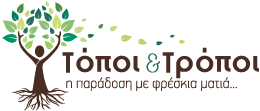 Τόποι και Τρόποι Πολιτιστικοί Σύλλογοι, Ελληνική Παράδοση, Ήθη και Έθιμα από όλη την Ελλάδα, Ελληνική Πολιτιστική Παράδοση.
Τόποι και Τρόποι Πολιτιστικοί Σύλλογοι, Ελληνική Παράδοση, Ήθη και Έθιμα από όλη την Ελλάδα, Ελληνική Πολιτιστική Παράδοση.

